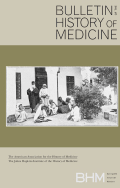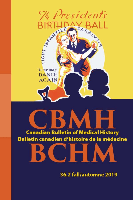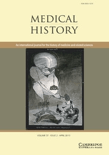
SOCIAL HISTORY OF MEDICINE
Scope & Guideline
Exploring the Intersections of Society and Medicine
Introduction
Aims and Scopes
- Interdisciplinary Historical Analysis:
The journal promotes a comprehensive understanding of medicine by integrating historical narratives with sociological and anthropological perspectives, focusing on how these disciplines inform one another. - Global Health Perspectives:
It emphasizes the global dimensions of health and medicine, exploring how historical events, policies, and practices impact health outcomes across different cultures and societies. - Focus on Marginalized Voices:
The journal highlights the experiences and contributions of marginalized groups in medicine, including women, racial and ethnic minorities, and individuals with disabilities, thus broadening the scope of medical history. - Critical Examination of Medical Practices:
Papers often critique historical and contemporary medical practices, addressing issues of ethics, power dynamics, and the socio-political implications of health interventions. - Exploration of Medical Technologies and Innovations:
The journal investigates the historical development of medical technologies and innovations, analyzing their impacts on societal health and individual experiences. - Cultural Representations of Health:
It examines how health and illness are represented in various cultural forms, including literature, art, and media, revealing the complex ways in which cultural narratives shape health perceptions.
Trending and Emerging
- Impact of Global Pandemics:
Recent publications increasingly address the historical and social implications of global pandemics, particularly COVID-19, reflecting a contemporary urgency to understand the socio-political responses to health crises. - Intersectionality in Health:
There is a growing emphasis on intersectional analyses that explore how various identities (e.g., gender, race, class) intersect to shape health experiences and outcomes, highlighting the complexities of health equity. - Environmental Health Histories:
Emerging research is focusing on the historical relationships between environmental factors and health, exploring how environmental changes have influenced disease patterns and public health responses. - Mental Health Narratives:
Recent papers are increasingly concerned with the social history of mental health, examining institutional practices, societal perceptions, and the evolution of mental health care over time. - Medical Ethics and Policy:
There is a rising interest in the historical perspectives on medical ethics and public health policies, particularly in relation to issues of equity, access, and justice in healthcare. - Digital Humanities in Medical History:
The use of digital tools and methodologies to analyze historical health data and narratives is gaining traction, indicating a trend towards integrating technology into the study of medical history.
Declining or Waning
- Traditional Medical Practices:
There has been a noticeable decline in studies focusing exclusively on traditional medical practices in isolation from broader socio-political contexts, suggesting a shift towards more integrated historical narratives. - Historical Biographies of Medical Figures:
Papers centered solely on biographical accounts of prominent medical figures are less frequent, indicating a shift towards collective histories and social movements rather than individual narratives. - Narrow Historical Timeframes:
Research that focuses on very specific historical periods without connecting to broader themes or contemporary implications is becoming less common, as the journal encourages more expansive and integrative approaches. - Descriptive Histories of Medical Institutions:
There is a waning interest in purely descriptive histories of medical institutions, as the journal increasingly favors critical analyses that explore the socio-political implications of these institutions. - Limited Geographical Focus:
Studies concentrating solely on Western medical history without comparative or global perspectives are less prevalent, reflecting a growing interest in transnational and cross-cultural analyses.
Similar Journals

BULLETIN OF THE HISTORY OF MEDICINE
Exploring the Roots of Modern MedicineBULLETIN OF THE HISTORY OF MEDICINE, published by Johns Hopkins University Press, stands as a vital resource in the field of medical history, bridging the gap between historical research and contemporary medical practices. With a robust history dating from 1945 to 2024, this esteemed journal aims to foster a deeper understanding of medicine's past, exploring how historical contexts have shaped medical ideas, practices, and institutions. The journal boasts an impressive Q1 categorization in History and ranks among the top quartiles in related fields, highlighting its impact and relevance in academia. Although it does not offer open access, the journal’s contributions are invaluable for researchers, educators, and students alike seeking to understand the intricate narratives that underpin modern medicine. With its focus on interdisciplinary scholarship, the BULLETIN OF THE HISTORY OF MEDICINE remains essential for those committed to uncovering the complexities of medical development through time.

HISTORY OF PHOTOGRAPHY
Exploring the Lens: Unveiling the Narrative of PhotographyHISTORY OF PHOTOGRAPHY is a prestigious scholarly journal published by Taylor & Francis Ltd, focusing on the rich and evolving narrative of photography as an art form and cultural phenomenon. With an ISSN of 0308-7298 and E-ISSN 2150-7295, this journal has established a significant presence since its inception in 1977, with an anticipated run into 2024. Positioned in the Q4 category of the Visual Arts and Performing Arts field, it ranks within the 51st percentile among its peers, affirming its role in the scholarly discourse of photography. Although not an Open Access journal, it maintains accessibility for academics through institutional subscriptions and various library networks. The journal aims to foster interdisciplinary dialogue, encompassing diverse perspectives on the history, theory, and practice of photography, making it an invaluable resource for researchers, professionals, and students alike who are seeking to deepen their understanding of this dynamic medium.

JOURNAL OF THE ROYAL SOCIETY OF MEDICINE
Discovering Insights That Transform Healthcare PracticesJOURNAL OF THE ROYAL SOCIETY OF MEDICINE, published by SAGE PUBLICATIONS LTD, is a leading platform in the field of general medicine, committed to advancing medical knowledge since its inception in 1908. With an impressive impact factor and a ranking of #47 out of 636 in the Scopus database, it is positioned firmly within the top quartile (Q1) of Medicine (miscellaneous). This esteemed journal serves as a vital resource for researchers, medical professionals, and students, offering a wealth of high-quality articles that cover a diverse range of topics in healthcare and medical research. Although not currently open access, the journal's acclaimed content contributes significantly to the ongoing dialogue within the medical community, making it indispensable for anyone seeking to stay at the forefront of medical science. We invite you to explore the advancements and discussions published here, as they will shape the future of medicine and healthcare practices.

Anthropology & Medicine
Unraveling Health Complexities Through Social Science.Anthropology & Medicine, published by Routledge Journals, Taylor & Francis Ltd, represents a vital intersection of social sciences and health research, providing a platform for innovative scholarship in the field of anthropology and its implications for medicine. With an esteemed 2023 Scopus ranking placing it in the top tiers of anthropology and arts and humanities, this journal fosters critical dialogue between anthropological insights and medical practice, addressing pressing health issues through ethnographic lenses. The journal’s scope includes the exploration of cultural practices, health inequalities, and the social determinants of health, making it essential reading for researchers, professionals, and students dedicated to understanding the complexities of human health in diverse contexts. Although not an open access publication, its rigorous academic standards and impactful research contributions underscore its importance within both anthropology and medical fields, as reflected in its impressive category quartiles and its convergence from 1997 to 2024. Engaging with this journal positions scholars at the forefront of discussions shaping the future of healthcare and anthropology.

SOCIAL HISTORY
Fostering Understanding of History's Social TapestrySOCIAL HISTORY, published by Routledge Journals, Taylor & Francis Ltd, is an esteemed journal dedicated to advancing the field of historical research, specifically focusing on the social dimensions of history. With an ISSN of 0307-1022 and an E-ISSN of 1470-1200, this journal has consistently contributed to the scholarly discourse since its inception in 1976. Positioned in the Q2 category for history in 2023, it ranks 240 out of 1760 in the Arts and Humanities, placing it in the top 14% of its field according to Scopus metrics. Although it is not an Open Access journal, its accessibility through institutional subscriptions ensures that a wide range of researchers, professionals, and students engage with its rich variety of articles that explore social history's diverse themes and methodologies. The journal aims to foster a deeper understanding of how historical events shape societies, offering valuable insights for those interested in the intricate interactions between past and present.

Canadian Bulletin of Medical History
Connecting Scholars to Canada’s Rich Medical Heritage.Canadian Bulletin of Medical History is a pivotal academic journal dedicated to the exploration and documentation of the historical aspects of medicine in Canada. Published by University of Toronto Press Inc., this journal has been a critical platform for scholars and researchers to disseminate their findings since its inception in 1984, with coverage extending to 2021. Although its Scopus coverage has recently discontinued, it remains a valuable resource in the field, holding a Q4 rank in Medicine (miscellaneous) as of 2023. The journal encourages an open dialogue on medical historiography, emphasizing interdisciplinary approaches that enhance our understanding of the medical past. Researchers, professionals, and students will find a treasure trove of knowledge in its articles, which shed light on various facets of Canada’s medical history. As an Open Access journal, it ensures that its findings are readily accessible to a global audience, fostering collaboration and innovation in medical historical research.

PERSPECTIVES IN BIOLOGY AND MEDICINE
Exploring the Intersections of Life and HealthPERSPECTIVES IN BIOLOGY AND MEDICINE, published by the esteemed Johns Hopkins University Press, has been a cornerstone of interdisciplinary dialogue since its inception in 1957. With a rich history spanning over six decades, this journal delves into the multifaceted interactions between biology and medicine, offering insights that are vital for health policy, ethics, and the philosophy of science. Recognized for its impact, it holds a Q2 ranking in the History and Philosophy of Science category and Q3 rankings in several other relevant fields as of 2023. While not an open-access publication, it provides critical analyses and discussions that are indispensable for researchers, professionals, and students alike. With its committed editorial team, PERSPECTIVES IN BIOLOGY AND MEDICINE continues to foster scholarly engagement and is poised to shape the future discourse in the biosciences.

Journal of Medical Humanities
Fostering Interdisciplinary Dialogue in Medical HumanitiesJournal of Medical Humanities, published by Springer, serves as a critical platform for interdisciplinary research at the intersection of medicine, health policy, and the humanities. Established in 1989 and set to continue its scholarly contributions through 2024, this journal addresses the complex dynamics between health, culture, and society, making it a significant resource for academics, practitioners, and students in the social sciences. Although it operates under a subscription model, the journal maintains an impactful presence with a 2023 Scopus ranking that places it in the Q3 category for both health policy and health (social science), reflecting its commitment to insightful discourse and research quality in these vital areas. Moreover, with a focus on innovative methodologies and discussions, the Journal of Medical Humanities remains essential reading for anyone interested in understanding the role of the humanities in shaping healthcare narratives and policy.

MEDICAL HISTORY
Charting the Course of Medicine Through Historical PerspectivesMEDICAL HISTORY is a prestigious journal published by Cambridge University Press, focusing on the interdisciplinary field of medical history and its implications on contemporary healthcare practices. With a commitment to providing rigorous research since its inception in 1957 and continuing through to 2024, this journal holds a significant position in academic discourse, exemplified by its Q1 ranking in History and respectable Q3 rankings in Medicine (miscellaneous) and Nursing (miscellaneous). Its scholarly contributions serve as a vital resource for researchers, professionals, and students alike, facilitating a deeper understanding of the evolution of medical practices and their societal impacts. Although MEDICAL HISTORY operates under a traditional subscription model and does not utilize Open Access, it remains accessible through libraries and academic institutions, ensuring that its wealth of information fuels ongoing discussions in both historical and medical contexts. With robust Scopus rankings indicating a strong standing in the fields of Arts and Humanities as well as Medicine, this journal is essential for anyone seeking to explore the intricate relationship between history and health.

HISTORY OF PSYCHIATRY
Charting the Historical Landscape of Psychiatric AdvancesHISTORY OF PSYCHIATRY is a distinguished scholarly journal published by SAGE PUBLICATIONS LTD, dedicated to advancing the field of psychiatry through the exploration of its historical contexts and developments. Since its inception in 1990, the journal has been a valuable resource for researchers, professionals, and students in psychiatry and mental health, delving into the evolution of therapeutic practices, social perceptions, and scientific advancements that have shaped the discipline. With an ISSN of 0957-154X and an E-ISSN of 1740-2360, it remains a key player in the academic landscape, currently holding a Q4 quartile ranking in Psychiatry and Mental Health as per the 2023 categorization. Although the journal is not Open Access, its curated articles contribute significantly to understanding past and present mental health challenges, ultimately informing future practices. Positioned in the UK, at 1 Olivers Yard, 55 City Road, London, HISTORY OF PSYCHIATRY is poised to inspire critical discourse and foster scholarly insights in a field that continuously evolves.